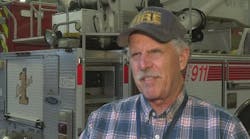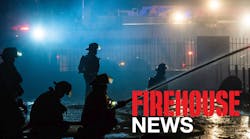A few months ago, I came across a very interesting article in the Star Ledger newspaper of Newark, NJ. It dealt with the fact that the best leaders are good listeners. I found this to be immensely interesting, since I am bad listener by nature.
Many years ago, I took part in an oral-examination process for the position of fire chief in a large city in the Midwest. I felt that I had done very well. Since I had to leave town immediately after the final interview session, I missed out on the debriefing session for all of the candidates.
About a week later, I received a telephone call from one of the lead assessors. He said that I placed in the top three on the candidates list. This kind gentlemen then spent a great deal of time debriefing me on my participation in the many exercises. He indicated that I had done well on each part of the examination, and in fact had achieved the highest traditional oral interview grade.
This kind soul then explained the primary reason why I had not placed first on the list: my listening skills were not all that they could have been. He said that I tended to interrupt people before they were done completing their thoughts. He also said that I had a habit of completing other people's phrases. Had I been a better listener, I may well have been the fire chief of that city 20 years ago.
The lessons that I learned from that long-ago interview remain with me to this day. I have worked to be a better listener. Like any other long-term project, there have been some successes and some failures. I am probably better now, but backsliding can occur at any time. I have worked diligently to be better.
Why do we have to be good listeners? Because, if you are trying to talk while someone else is attempting to express a thought, you may miss someone else's good idea. Some of the best things that have ever happened to me came as a result of advice from a friend or a suggestion from a stranger. If I had not been listening, I would have missed their thoughts.
Carter and Rausch tell us in Management in the Fire Service (third edition) that "… officers need to be aware of their listening competence, so they can practice, reflect, assess their strengths and weaknesses, and improve their habits." They go on to stress that listening is a two-way street. In order for listening to be effective, some action has to occur.
We all need to be aware of the true nature of listening. Carter and Rausch add that "… effective listening occurs at two levels: passive and active listening. Passive listening is merely paying attention to what the speaker is saying. Active listening includes empathy and the responsibility for understanding the speakers full thought. Active listening requires two-way communications." In other words, you have to work at it.
Active listening is something you can learn. What are some of the things you have to work on? Here is a short list that I have memorized:
- Always look at the person to whom you are listening.
- Concentrate on the ideas being proposed to you.
- Avoid framing your response to the speaker while he or she is still talking.
- Listen to what you are saying.
- Do not speak until the other person has stopped talking.
I can recall working with an individual who never let me finish a statement or complete the verbal exploration of a thought. It was very difficult to communicate with this person, because he was always talking and never listening. Of course, it gave me the opportunity to practice my skills as a listener. It also forced me to focus, because I never knew where a conversation was headed. I feel that much was lost by the lack of a full two-way interaction.
Many years ago, I had an appointment with the chief of the Memphis, TN, Fire Department, Edward Hamilton (now deceased). The time was 1970, and I was a U.S. Air Force firefighter stationed in Arkansas. I was thinking of staying in Memphis after my separation from the service. I had several friends who wanted to see me join them on the fire department, and were working behind the scenes to make this happen.
They all gave me the same piece of advice. Chief Hamilton was a no-nonsense person, and he appreciated a person who looked him right in the eye and paid close attention to what he was saying. For those of you who know me and may have known Chief Hamilton, you can understand how tough this was. At the time I was real big, and the chief was diminutive.
But I did as I was told, and the interview went fairly well. Of course, once my days in the service were over, I did what most people do when they are released from active duty - I returned home with a speed approximating that of light. But I took the look-them-in-the-eye lesson of my meeting with Chief Hamilton home with me. It has served me well many times over the past three decades. And remember, if someone is looking you in the eye, it is tougher for them to talk behind your back. Or at least it is that way for most decent people.
An area that often gets overlooked in any discussion of listening involves the use and monitoring of non-verbal clues. What people do and how they act can give you a clue as to whether they are actually listening. I can recall being at a meeting one afternoon at which the boss spent more time glancing at his watch than listening to my ideas.
There is also the Bright Sunny Day syndrome. You are attempting to talk with someone and he or she is looking at the first robin of spring landing on a tree limb right outside of the window. You may as well be speaking Greek to a group of grade-school students, for all the success you will have. That is, unless you happen to be a guest in an Athens middle school.
And how many times have you attempted to talk with someone, only to be interrupted by the ringing of a phone, the buzzing of an intercom, and the "Could you please hold that thought for a moment"? On more than one occasion, my train of thought has been derailed by a runaway telephone.
Let me sum up this little trip through the world of leadership with a simple statement. People like to talk. But more importantly, people like to be heard. If you want to achieve your greatest success as a leader, make the listening skills we have discussed here a part of your permanent character and ethical portfolio. As I said in my last column, there are no quick fixes. You have to become a better listener one conversation at a time. Go for it.
Harry R. Carter, Ph.D., MIFireE, a Firehouse® contributing editor, is a municipal fire protection consultant based in Adelphia, NJ. He is also an associate professor at Mercer County Community College and a past chief and active life member of the Adelphia Fire Company. Dr. Carter retired from the Newark Fire Department in 1999 as a battalion commander. He also served as chief of training and commander of the Hazardous Materials Response Team. Dr. Carter is a Member of the Institution of Fire Engineers of Great Britain (MIFireE). He may be contacted through his website at [email protected].





